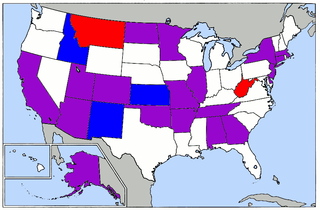
Via Wikipedia: Twenty-four states are holding caucuses or primary elections on Super Tuesday, 2008. Blue denotes Democratic-only caucuses (3), Red illustrates Republican-only contests (2), and Purple represents states holding elections for both parties (19).
For citizens of the U.S. like me, it's Super Tuesday. Over twenty states are holding their presidential primaries or caucuses today. Mine is not among them, but two neighboring states are included, so we're caught up in the frenzy by default.
On the radio this morning, I heard that there are more delegates up for grabs today than at any point in U.S. history. I'm not sure how that can be verified, but I can certainly see the logic in such a claim. This great volume of delegates is probably due to the nature of this campaign (it's the first since sometime in the 1800s that an incumbent President or his VP was not in the race) as much as the fact that we are just getting to the point where we might see a front runner in the two main political parties. I mean, it is feasible that by this time tomorrow, the nominations will still be very much up for grabs and we'll need the remaining primaries to solidify someone's dominance. But it is equally if not more likely that the nominees will be crowned tonight.
Given all the fuss over Super Tuesday, and the fuss over states that moved their primaries to an earlier point in the calendar for this election year, has anyone given any thought to how well the U.S. primaries work ... or don't work?
Well, Steven Hill in San Francisco has
thought it out. He thinks the current system is fraught with problems, and he therefore believes that the current process does not result in the best candidates. Is he simply griping? Nope, he has outlined an alternative.
And I have to admit ... I think he is making some sense.
He proposes a National Plan that would "establish a total of four primary days, each held a month apart." To achieve this, our 50 states would have to be grouped by population into four clusters. The first primary day would be for the group of states with the smallest populations, and the voting days would progress toward the final group which contains states that have the largest populations.
The funny thing is that this is not a new idea. According to Hill, it was almost adopted by the Republican National Convention in 2000. The other funny thing about this idea is that I had to read it online via cafebabel.com, a European current affairs magazine. To my knowledge, it's not being discussed in the states.
Check out Steven Hill's "
Super Stupid Tuesday" and let me know what you think about the idea.


No comments:
Post a Comment